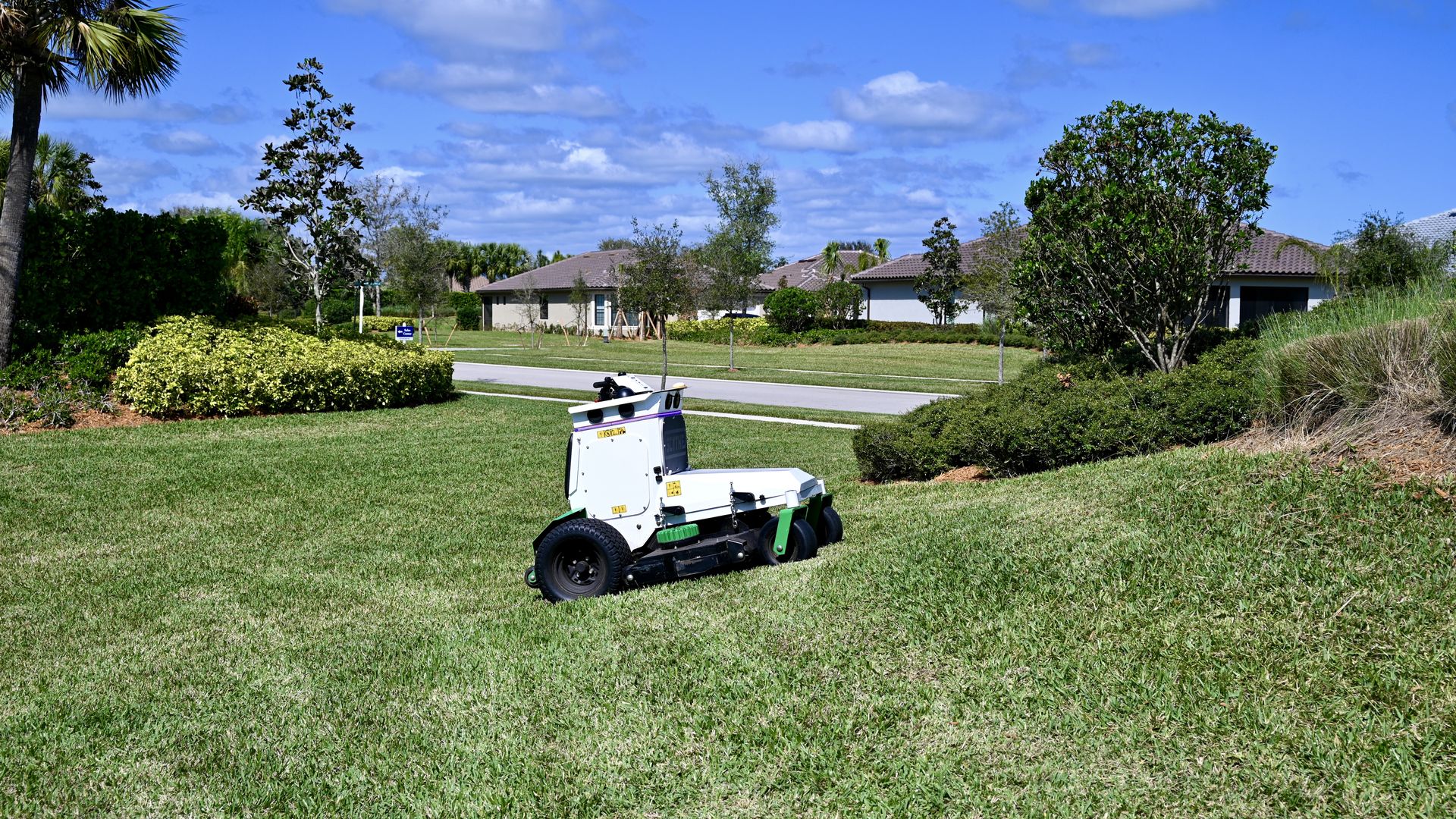| | | | | | | Presented By BigSpring | | | | Axios What's Next | | By Jennifer A. Kingson and Joann Muller · May 13, 2022 | | Happy Friday! Let's get down to it. - Today's reader photo comes from Billy Otteman, who works for a company that says it represents the future of lawn mowing.
- Got a picture for us? Email it to whatsnext@axios.com.
Today's Smart Brevity count: 1,178 words ... 4½ minutes. | | | | | | 1 big thing: Mayors tackle mental health |  | | | Illustration: Maura Losch/Axios | | | | New programs in cities like New York, Chicago and London aim to combat the rising loneliness, anxiety and unhappiness that COVID-19 has caused, Jennifer A. Kingson writes. Why it matters: Pandemic-related emotional problems have been linked to everything from higher crime to a rising teen suicide rate. While it's not clear how much a municipal mental health program can move the needle, a growing number of mayors — flush with pandemic relief funds — are willing to try. Driving the news: Alarmed by what they see from their front-row seats, "mayors are making investments and working with local nonprofits, businesses and community groups to create new initiatives that will help residents access mental health services and reduce the stigma," Tom Cochran, CEO and executive director of the U.S. Conference of Mayors, writes in Medium. - In New York City, an initiative called "Mental Health for All" directs residents to counselors and crisis hotlines.
- In Chicago, a campaign called "Un[*]Spoken" counsels people about loneliness and helps them find emotional support.
- London's "Campaign to End Loneliness" encourages people to seek social connections and counteract any lingering feelings of lockdown isolation.
Even smaller municipalities are getting into the act: The mayor of Macon-Bibb, Georgia, introduced "Macon Mental Health Matters," which offers free counseling as well as yoga classes and the like. - It's being funded with $600,000 from the CARES Act.
Where it stands: "In many cities, there simply are not enough mental health professionals to meet the surge in demand they've seen over the past two years," Cochran writes. - A poll of 126 U.S. mayors released late last year found that constituents' emotional trauma was the top concern.
CEOs have some of the same concerns as mayors: Some companies are doubling down on mental health outreach programs for employees, though there's plenty of criticism that Corporate America isn't doing enough. - "Chief happiness officer" is an emerging new title at some firms, the Wall Street Journal reports.
Read the full story. |     | | | | | | 2. Self-driving cars could be potential crime witnesses |  | | | Illustration: Aïda Amer/Axios | | | | The police in San Francisco see camera-laden autonomous vehicles as potential witnesses in their criminal investigations, setting off alarm bells for privacy advocates, VICE reports. Why it matters: As Axios has reported, self-driving cars capture and store huge databases of images so that they can train their algorithms and become better drivers. What that means is that bystanders are often captured in the footage, raising privacy concerns, Joann Muller writes. Driving the news: The police use of AV footage as evidence came to light because of a public records request from VICE's technology website, Motherboard. - A three-page San Francisco Police Department training guide provided to the website explained how officers should interact with AVs that don't have a human driver, mentioning Waymo and Cruise, two of the industry leaders.
A section titled "Investigations" advised officers of the AVs' usefulness in collecting footage, saying that this "potential evidence" had been accessed several times already. - "Autonomous vehicles are recording their surroundings continuously and have the potential to help with investigative leads."
Privacy advocates warn that law enforcement agencies are extending their "web of surveillance" using information like Ring doorbell footage, automated license plate readers and location data purchased from private companies. - "As companies continue to make public roadways their testing grounds for these vehicles, everyone should understand them for what they are — rolling surveillance devices that expand existing widespread spying technologies," Chris Gilliard, visiting research fellow at Harvard Kennedy School's Shorenstein Center, told VICE.
The other side: "The SFPD can unequivocally state that we do not use autonomous vehicles to surreptitiously surveil people in the City of San Francisco," an agency spokesman told Axios by email. What they're saying: "Waymo captures data that's relevant for training our tech, not to identify individuals," a Waymo spokesman said. - "Our policy is to challenge, limit or reject requests that do not have a valid legal basis or that are overly broad."
- A Cruise spokesman said: "We work closely with law enforcement on our common goal of making our roads safer. We share footage and other information when we are served with a valid warrant or subpoena, and we may voluntarily share information if public safety is at risk."
Share this story. |     | | | | | | 3. Startup raises $17 million to develop a smart gun |  | | | Illustration: Annelise Capossela/Axios | | | | Biofire Technologies has raised $17 million in seed funding to further develop its smart gun, which uses a fingerprint sensor to unlock the trigger, Dan Primack writes in Axios Pro Rata. Why it matters: Firearms were the No. 1 cause of death for children in 2020, according to new research based on data from the Centers for Disease Control and Prevention. 35% of those deaths were suicides. - Total firearm-related deaths, including both adults and children, also hit an all-time high in 2020.
The good news is that Biofire's guns can only be fired by authorized users, which should prevent kids or teens from discharging guns that their parents didn't secure. - Even if you're someone who decries firearms proliferation and supports stricter gun control, this is an innovation that should be welcomed.
Keep reading. |     | | | | | | A message from BigSpring | | The tools journalists need | | |  | | | | Facebook, the world's largest news aggregator, is providing journalists in emerging digital markets with training through BigSpring. Why it's important: Many journalists in these markets don't have the tools they need to cover news effectively. Learn more. | | | | | | 4. Southwest "megadrought" is a scary omen |  Data: NOAA; Chart: Erin Davis/Axios Visuals It's only May, and the worsening, long-term drought in the Southwest is taxing water managers, firefighters and even homicide detectives in new ways, Andrew Freedman writes in Axios Generate. Why it matters: The region is stuck in a "megadrought" lasting more than two decades, and studies show it has been the driest period in over 1,200 years. - It is also the first megadrought to be driven in large part by human-caused warming, as increased temperatures lead to a thirstier atmosphere in a feedback loop that dries out the landscape faster and in turn allows the air to heat up even more.
The big picture: California just recorded its driest first four months of the year, encompassing a crucial period during the state's wet season. Threat level: In California, local authorities have been issuing increasingly draconian water restrictions, and the state is entering a dry season with both its reservoirs near record lows. The intrigue: As the water level drops in the nation's largest manmade reservoir, Lake Mead in Arizona and Nevada, long-hidden bodies are being unearthed. - The first instance of skeletal human remains was discovered on May 1, inside a rusted metal barrel.
Keep reading. |     | | | | | | 5. Robot lawn mowers |  | | | The M.52 autonomous lawnmower. Photo courtesy of Billy Otteman/Scythe Robotics | | | | Axios What's Next reader Billy Otteman writes: "In your newsletter, we saw your call for photos of robots doing eye-catching things. Well, we are making fully autonomous commercial lawn mowers, which is pretty wild!" - "I am with Scythe Robotics, a shop in Boulder County, Colo., bringing advanced autonomous technologies to outdoor power equipment. Our first product is M.52, the mower that is catching a lot of attention from the public as it mows on its own."
Details: Scythe Robotics' website says the 1,100-pound M.52 lawn mower can run all day on a battery that gets charged overnight. "Smell grass, not gas" is a company motto. - The pitch to professional landscapers: "Your team can spend their valuable time keeping properties looking their best while the robot handles the mowing."
|     | | | | | | A message from BigSpring | | Don't fall behind innovation | | |  | | | | Google innovates quickly, that's why they depend on BigSpring to deploy high-velocity product training, remove friction and improve skills sharing. Why it's important: With the help of BigSpring, Google was able to bring new product features to market 300% faster. Learn how. | | | | Was this email forwarded to you? Get your daily dose of What's Next magic by signing up for our free newsletter here. |  | It's called Smart Brevity®. Over 200 orgs use it — in a tool called Axios HQ — to drive productivity with clearer workplace communications. | | | | | | Axios thanks our partners for supporting our newsletters. If you're interested in advertising, learn more here.
Sponsorship has no influence on editorial content. Axios, 3100 Clarendon Blvd, Suite 1300, Arlington VA 22201 | | | You received this email because you signed up for newsletters from Axios.
Change your preferences or unsubscribe here. | | | Was this email forwarded to you?
Sign up now to get Axios in your inbox. | | | | Follow Axios on social media:    | | | | | |









No comments:
Post a Comment